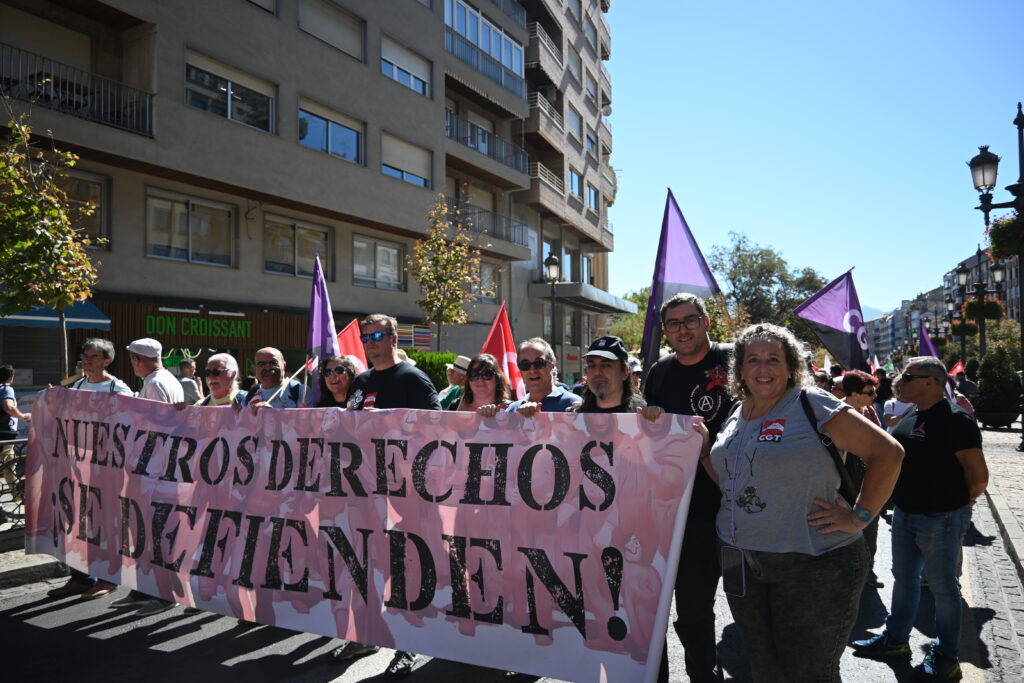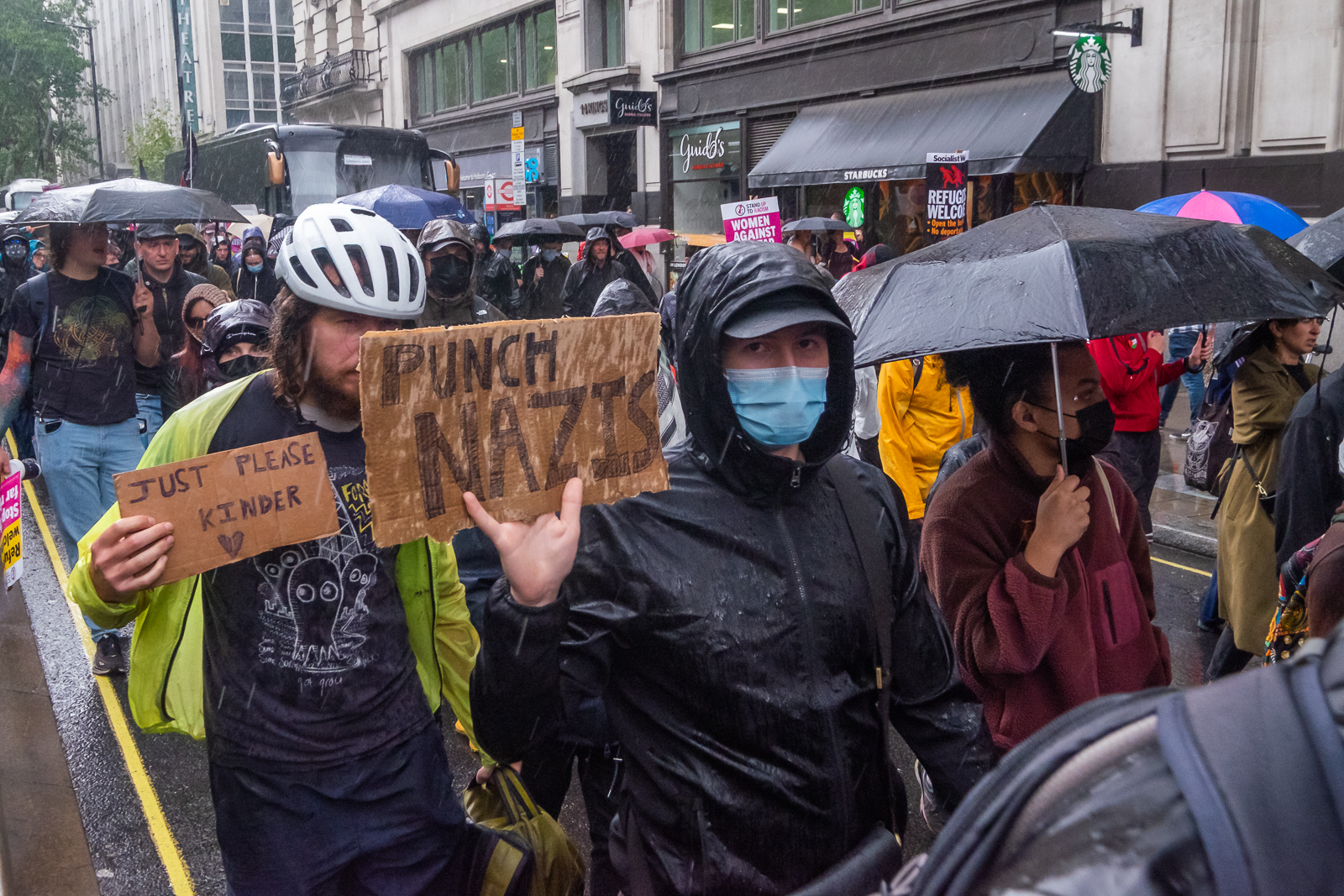Capital is tearing at its seams and new insurrectional and revolutionary waves are emerging; it is now that anarchism can find a powerful ally in certain sectors of degrowth
from Libre Pensamiento
Fossilist capitalism has already entered a phase of perhaps-insurmountable difficulties to guaranteeing the reproduction of capital and the labor force. As if that were not enough, there are currently three major threats: climate change, the destruction of biodiversity, and global energy decline. Given this, capitalism has initiated a new reordering of the power system, a new restructuring that prepares a new order of energy and production. What can social movements, workers and the excluded do in this context? In anarchist, libertarian and surrealist circles the view is very clear: make the revolution, or in other words: the restoration of human community. There are only two options: either the revolution, or an increase in disaster (social, ecological…); and if a middle path is chosen, it will end up falling into disaster. To face this fight, I believe that anarchism can find a necessary ally in certain currents of degrowth.
The first thing that should be said is that degrowth is not a clearly-defined movement; It is a mixed bag in which too many things fit. We can talk about everything from eco-Marxist, eco-socialist and social democratic degrowth to primitivist, ruralizing or anti-capitalist degrowth, and even conservative or far-right degrowth. Therefore, degrowth could be defined as an awareness to biophysical and energetic limitations, adaptable to any ideology. Here, my criticisms will focus on the majority trend, which enjoys the greatest prominence, that of social democratic degrowth.
What to take and what not to take from degrowth?
Spreading the truth involves showing, in all their harshness, realities such as the alarming loss of biodiversity, the advance of climate change, the global energy decline and the lack of alternatives in this regard, the outrages of extractivist neocolonialism, or the links between industrialization and ecocide. In that sense, degrowth in general is doing a commendable job. Summing up a great deal, we can say that degrowth is correct in the diagnosis of the current situation of the planet, based on information and data from bodies such as the International Energy Agency (IEA), the World Meteorological Organization (WMO) or the Intergovernmental Panel on Climate Change (IPCC). Anarchists should definitely not reject these scientific assessments just because they come from state and government scientific institutions. Similarly, authors like Antonio Turiel or Jorge Riechmann, although they do not share our ideology and work in institutes such as the Spanish National Research Center (CSIC) or the public university, are carrying out brave and excellent dissemination work — not at all reactionary — both in talks and conferences and in seminars and meetings.
That said, we cannot ignore that when degrowth denounces the harmfulness of capitalism, it remains in a diffuse terrain and does not delve into capitalist relations themselves, or into issues that have to do with the automatic nature of the commodity and the law of value. Their criticisms of capitalism are full of vagueness, and they end up accepting by omission the relations of capitalist production and, therefore, the internal economic logic that governs our lives. It would seem then that what degrowth proposes is nothing more than prolonging the historical agony of capital accumulation and the global production of goods, but now in conditions of low energy. This is where degrowth appears most insufficient and even, many times, counterrevolutionary. Miquel Amorós is right when he states that “As an attempt to get out of capitalism without abolishing it, by taking action and entering the field of facts, the degrowthers converge with the old and abandoned social democratic project of abolishing capitalism without ever leaving it”. To understand this “non-exit” from capitalism due to degrowth, we usually resort to the metaphor of the emergency brake; If degrowth proposes that the speed of the capitalist train should decrease, anarchism proposes pulling the emergency brake and making it decelerate so that it stops as soon as possible without danger to the passengers.
Degrowth does not consider the abolition of private property to be necesary, and its position regarding the State is, in most cases, ambiguous. Although it proposes changing the real production relations, degrowth assumes a transitional period in which reformist paths, adopted by the State, can be taken. In some way the same thing happens to these degrowthers as to the decolonial movement, when – as Peter Genderloos has already pointed out – in their criticisms of colonialism they leave the State intact, as if it had not been an indispensable element for historical colonialism or for the current extractivist neocolonialism.
Moreover, many degrowthers, driven by political possibilism, place great hopes in taking on parliamentary politics. In fact, many are included in parties like Sumar. This means that these degrowthers end up subjecting their speeches, proposals and representations of truth to electoral dynamics, which entails moderation. There is a desire to seek consensus, to please everyone, something already denounced by authors like Alexander Dunlap. Another interesting criticism of degrowth has to do with the meduim in which its discourses are configured and expanded, which is mainly in the academic sphere. Degrowth has its origins in writings of academic intellectuals, students and university professors. It is not a grassroots movement, it does not arise from unions, nor does it draw from movements such as deep ecology or from organizations such as Earth First! or the anti-industrial movement, much less from the autonomous groups that acted in Europe during the 1960s and 70s. Another negative element is that the place where degrowthers are having more and more popularity is on social networks. What’s more, there are more and more talks or online courses on degrowth. This means that their speeches are subject to the impositions of brief, fast and superficial language that does not favor careful reading. And beyond any possible algorithmic censorship, in order not to scare and gain more followers, it is the authors themselves who avoid radical language.
As if this were not enough, degrowth avoids what it fears most: class struggle. For them there is no class struggle. What is more, they do not even adopt an explicit class discourse on the matter. And all of them renunce revolution, even avoiding the word. None of Serge Latouche’s famous eight Rs — which for many are the pillars of degrowth — corresponds to the R of revolution. So degrowthists resort to vague and apparently neutral expressions such as jumping to a “new productive rationality” or “deconstructing the economy”. There is, therefore, an absence of a revolutionary perspective. Last but not the least, there are terminological issues. It is about the use of the term “collapse”, a term that I consider inaccurate and misguided. It is a term that does not correspond to what is happening to current fossil capitalism, which can be confusing.

That said, what then can anarchism and libertarian movements take from degrowth? Many authors affirm that anarchism is degrowthist by definition. They would be surprised to know that, just as the left of capital has always ignored the awareness of environmental limits and certain resources, the discourses of many libertarian organizations and autonomous groups are crossed from end to end by the myth of progress and a blind adoration of the bogeyman of technological development, something that comes from a long time ago, as José Ardillo remembers well in his work Renewable Illusions. Fortunately, more and more libertarian organizations are aware of these limitations. Let us think for example of Embat, a libertarian organization from Catalonia and its statement “Nine points for degrowth“, or some authors who “bridge” between anarchism and degrowth such as Carlos Taibo, who by the way speaks clearly of ecotopias, direct democracy and revolution.
For anarchism to head down this path, just as it has been nourished by the anti-development movement and radical environmentalism, it could well do so also by certain current trends of degrowth. This could help anarchism take charge of the energy and technological limitations we are facing, as well as the harmfulness of the myth of progress. There are some minority degrowth positions – some in line with Murray Bookchin’s eco-municipalist degrowth and others located in what authors like Daniel García García have called self-managed degrowth – that have caught my attention; certain currents of degrowth with which we could establish collaborative ties and bring them to our ranks.
Many of them are in a border ideological terrain, in sectors that criticize the State and propose fair reforms, giving prominence to social movements and the defense of the territory. Let us think of authors such as Adrián Almazán and Luis González Reyes who, in their recent work Degrowth: from what to how, although they insist on the need for social movements that must force the State to adopt certain reformist measures, also endorse the struggles against the construction of highways, wind farms or new airports. If we take into account that these struggles are opposing a State that is at the service of large companies and corporations and, therefore, at the service of capital, is that not the beginning of an anti-state revolution, although it is in a very embryonic phase? Do these scattered struggles not arise in pursuit of the creation of other ways of life and production, that is, in pursuit of a revolution? Deep down these authors are talking about revolution, about a proletarian struggle that opposes a declining industrial and financial bourgeoisie struggling to maintain and increase its profits, but it seems that they dare not say the word revolution. In my opinion, it is to these small sectors of degrowth that anarchism must reach out in search of collaboration, even encouraging them to open a class-based and openly revolutionary current within degrowth.
Towards a decelerationist anarchism
Through this alliance between anarchism and self-managed degrowth, a revolutionary theory could therefore be developed that connects all that knowledge, related to the limitations of the biosphere and energy with the system of global production of goods and with the current situation of the proletariat and the new excluded. Which in turn would make us understand the type of capitalist restructuring that is already taking place and how to combat it. Likewise, it is necessary to design a common revolutionary project, a global libertarian communist program. From CNT-CIT, comrade Genís Ferrero has insisted that in the face of the decline of capitalism “we must be able to create organisation with capital letters, linking it to a general ideology and program that visualizes a global alternative in this society”. This program should point in three directions: Firstly, it must build solidarity networks and its own – anti-state – institutions based on mutual support to face the upcoming scarcity scenarios, and degrowth can contribute a lot in this sense. Secondly, it must establish defensive strategies against the destruction of the territory and against repression by States and large industry. Anarchism will undoubtedly find an ally in this type of degrowth that is connected to the struggles in defense of territory. As Alexander Dunlap says: “The connection between degrowth and anti-capitalist, autonomist and anarchist (ecological) movements can be reinforced to the extent that they converge to defend habitats” — but these struggles for the defense of territory are only one partial aspect of an entire social order that must be destroyed. These struggles must be connected with other struggles through the desire to break with that same social order, such as the union struggle, direct actions against banking entities, or sabotage of infrastructures of current capitalism. And this connects with the third leg of this revolutionary program: undertaking an offensive phase of struggle whose common objective is the abolition of value and the State-capital system of world production of goods, promoting revolutionary renewal.
There will be those who say that the international revolutionary movement barely has the power to do so or that the proletarianised population, the excluded, the marginalised and the insubordinate, are not coordinated, and focus on the specific events that give rise to their struggles. Seen this way, it would seem that we are far from a revolutionary renewal, but we forget that social antagonisms are increasing; We are witnessing the increasingly violent emergence of the contradictions inherent to capital — which is tearing at its seams — and new insurrectional and revolutionary waves are emerging throughout the world that perhaps already indicate the arrival of a new historical period. It is now that anarchism and anti-developmentalism can find a powerful ally in certain sectors of degrowth.
~ Vicente Guedero








